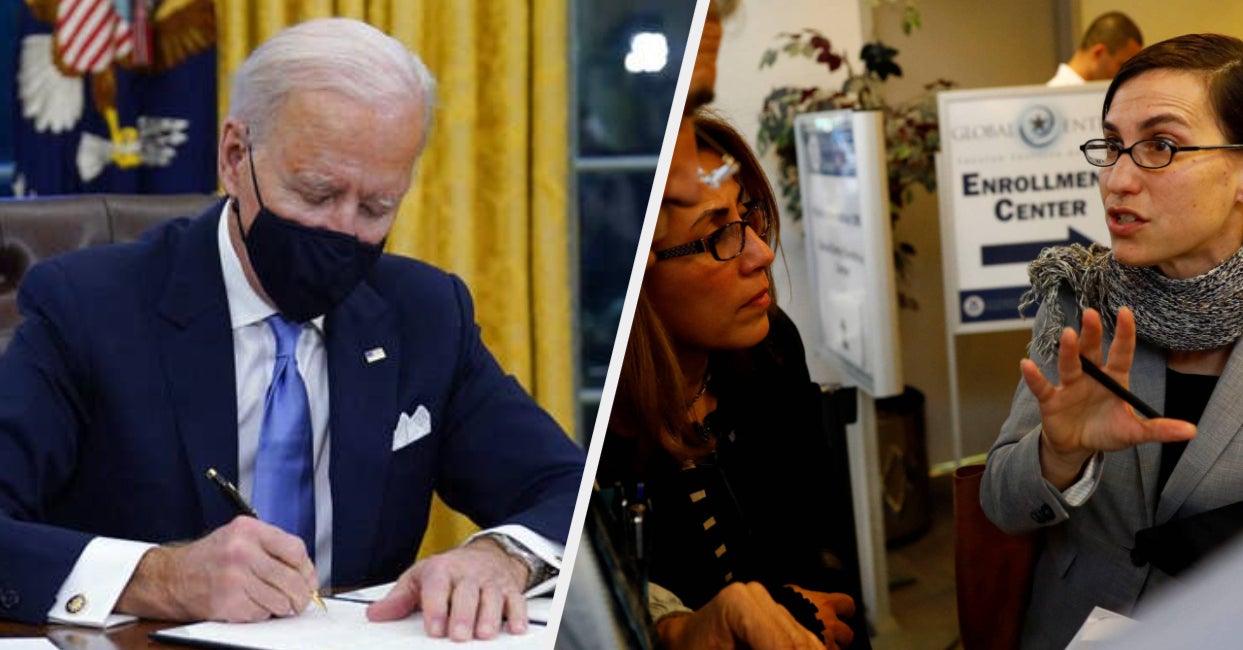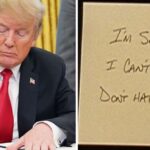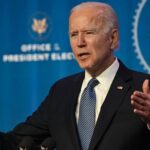
[ad_1]

Evan Vucci / AP
President Joe Biden signs his first executive order in the Oval Office of the White House.
President Joe Biden signed an executive order Wednesday revoking the Trump administration’s travel bans restricting visitors from predominantly Muslim and African countries.
Biden’s executive order, making good on a campaign promise to rescind former President Donald Trump’s travel bans on day one of his administration, instructs the State Department to restart processing visas for countries like Libya, Iran, Somalia, Syria, Yemen, Venezuela, and Nigeria.
Trump’s first travel ban, which went into effect on Jan. 27, 2017, created chaos and confusion throughout the world. Lawyers and protesters descended on US airports in an effort to help stranded travelers who were caught up in the ban and faced deportation. The ban would go on to keep families apart for years and refugees out of the country.

Patrick Fallon / Reuters
Attorney Talia Inlender, speaks with family members of Iranian passengers effected by the travel ban at Los Angeles International Airport.
Harsha Panduranga, an attorney at the Brennan Center’s Liberty and National Security Program, said it was a very important first step for the Biden administration.
“This is a really big deal,” Panduranga told BuzzFeed News. “Thousands of folks have been separated from their loved ones, and Biden did a good job overtly rejecting the policy as a racially and religiously bigoted ban.”
Panduranga urged the new administration to move as quickly as possible in creating a clear guide on reversing the travel bans.
Zahra Billoo, executive director of the Council on American Islamic Relations-San Francisco Bay Area, said Biden’s executive order corrects the course of so many disrupted lives in the US and abroad. The Biden administration also sends the message that anti-Muslim immigrant policies will not be tolerated, Billoo added.
“Tens of thousands of impacted individuals will now have the chance to be with their families during cherished and challenging times,” Billoo said in a statement. “While we know our work is far from over, today we celebrate the heroic efforts undertaken by so many over the last several years in our effort to repeal the Muslim and African Bans.”
Undoing the “harms” caused by the travel bans, as the Biden administration put it, will take more than just reversing Trump’s executive actions and resuming visa processing. Biden’s executive order also instructs the US government to develop a plan within 45 days for addressing the cases of people who were stuck in the waiver process, which granted exceptions for affected people who needed visas and otherwise would have qualified to get one.
Biden’s executive order also calls on the secretary of state to develop a proposal so that people who were denied visas because of Trump’s bans may have their applications reconsidered. The plan should consider whether to reopen immigrant visa applications denied because of two of Trump’s travel bans and whether it’s necessary to charge an additional fee to process them, the executive order states.
A 2019 analysis from the Cato Institute, a DC-based libertarian think tank, found that the travel ban kept about 15,000 spouses and adopted children of US citizens apart.
The first ban and a following version were legally challenged and struck down by lower courts, but the Supreme Court upheld a third iteration in 2018. The travel restrictions were later expanded to include six countries, four of them in Africa.
People from thirteen countries ultimately faced travel restrictions, including Libya, Iran, Somalia, Syria, Yemen, North Korea, Venezuela, Nigeria, Kyrgyzstan, Myanmar, Eritrea, Sudan, and Tanzania
One of the Supreme Court’s justifications in upholding Trump’s ban was that his presidential proclamation included a waiver program, which provided exceptions. The Bridge Initiative, a research project on anti-Islamic sentiment housed in Georgetown University, found that 74% of visa waivers were declined between December 2017 and April 2020 for all countries affected by the bans.
Opponents of Trump’s ban said it discriminated against Muslims and pointed to his 2015 campaign statement calling for “total and complete shutdown of Muslims” entering the US until the country “can figure out what is going on.”
Aarti Kohli, executive director of Asian Americans Advancing Justice – Asian Law Caucus, said Biden’s repeal of Trump’s travel bans represented a victory for their communities and the people who opposed them.
“Four years ago, we saw people of all races and religions come together to advocate against the bans, which have separated families and upended lives,” Kohli said in a statement. “As we celebrate the result of hard-fought advocacy, we will continue to pressure the Biden administration to take bold action, repair the damage of the last four years and bring justice to our immigrant communities.”
[ad_2]
Source link





